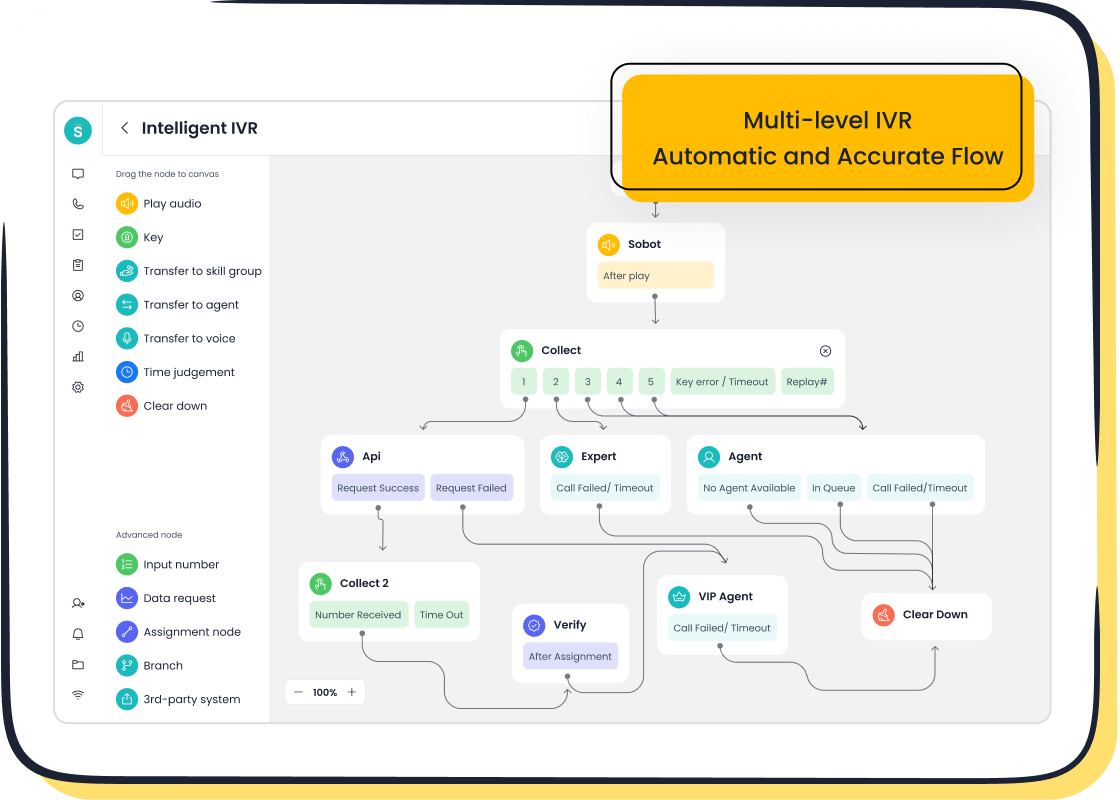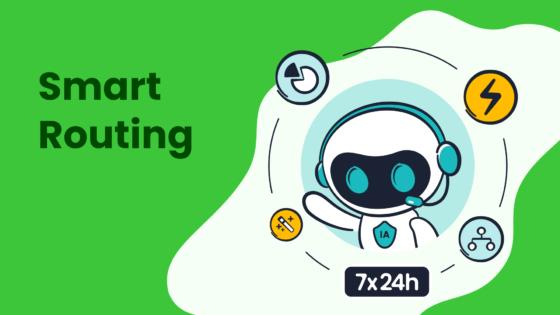Customer Service Recruitment Tips for Landing Top Jobs

Finding the best customer service jobs in 2025 starts with understanding the trends shaping the industry. Companies now prioritize skills over degrees, focusing on practical experience and digital fluency. Remote work has become a game-changer, with job postings for remote customer service roles skyrocketing by nearly 500% since 2020. This shift reflects the growing demand for flexibility and work-from-home opportunities.
To stand out in customer service recruitment, you need to embrace technology. Platforms like Sobot simplify customer interactions with tools like AI-powered voicebots and unified workspaces. These innovations not only enhance your efficiency but also make you a valuable asset in a competitive market. Whether you're eyeing remote jobs or hybrid roles, staying tech-savvy is your ticket to success.
Identifying Top Customer Service Roles in 2025
Types of Customer Service Jobs
Call Center and Voice Support Roles

Call center and voice support roles remain essential in 2025. These positions focus on handling customer inquiries and resolving issues over the phone. With tools like Sobot's AI-powered Voice/Call Center, you can streamline workflows and improve efficiency. Features like intelligent IVR and smart call routing make these roles more dynamic and tech-driven. If you're looking for remote positions, many companies now offer opportunities to work from home in this field.
Customer Success and Relationship Management
Customer success roles, such as customer success managers and client relations managers, are in high demand. These positions focus on building long-term relationships and ensuring customer satisfaction. For example, customer success managers play a key role in retention and satisfaction, with over 11,000 job listings on Indeed. If you enjoy nurturing relationships and solving problems, this could be a great career path.
Technical Support and Troubleshooting
Technical support roles are perfect if you have a knack for solving complex issues. These positions often require strong problem-solving skills and technical knowledge. Companies in industries like technology and SaaS frequently seek professionals for these roles. Tools like Sobot's unified workspace can help you manage customer interactions efficiently, making you a valuable asset in this field.
Characteristics of High-Quality Jobs
Competitive Salaries and Benefits
High-quality customer service jobs offer competitive salaries and benefits. Look for positions that provide health insurance, retirement plans, and performance bonuses. These perks not only enhance your financial stability but also reflect the company's commitment to its employees.
Opportunities for Remote and Work-from-Home Jobs

Remote work has become a major trend, with many companies offering flexible work-from-home jobs. These roles provide the freedom to balance your career and personal life. Platforms like Sobot's Voice/Call Center make remote jobs more accessible by enabling seamless communication and collaboration.
Positive and Inclusive Work Environments
A positive work environment fosters growth and satisfaction. Companies that prioritize inclusivity and employee well-being often have higher retention rates. When exploring opportunities, consider organizations that value diversity and provide a supportive culture.
Industries with High Demand
E-commerce and Retail
The e-commerce boom has created a surge in customer service recruitment. Companies in this sector need professionals to handle inquiries, process returns, and ensure a smooth shopping experience. If you're tech-savvy and enjoy fast-paced environments, this industry offers exciting opportunities.
Technology and SaaS
Technology and SaaS companies are always on the lookout for skilled customer support professionals. These roles often involve using advanced tools like Sobot's AI-powered solutions to enhance customer interactions. If you're interested in innovation, this industry is a great fit.
Healthcare and Financial Services
Healthcare and financial services are also experiencing high demand for customer service roles. These industries require professionals who can handle sensitive information with care and provide accurate support. If you have strong interpersonal skills and attention to detail, these sectors offer rewarding careers.
Skills and Qualifications for Customer Service Recruitment in 2025
Essential Soft Skills
Communication and Empathy
Strong communication and empathy are the backbone of customer service. You need to articulate solutions clearly while understanding the emotions behind a customer's concerns. Did you know that 96% of customers say the quality of service impacts their loyalty to a brand? This highlights how vital these skills are. Whether you're handling remote positions or in-office roles, being a good listener and showing genuine care can set you apart.
Here’s a quick list of soft skills that top employers value in 2025:
- Communication skills
- Listening skills
- Empathy
- Problem-solving
- Patience
- Stress management
- Time management
- Follow-up
- Working well under pressure
- Cultural sensitivity skills
Problem-Solving and Adaptability
Problem-solving and adaptability go hand-in-hand in customer support. You’ll often face unexpected challenges, and your ability to think on your feet makes all the difference. For example, adaptable agents can switch between communication channels or adjust to new customer needs seamlessly. This flexibility improves the customer experience and keeps you ahead in dynamic markets.
| Evidence | Explanation |
|---|---|
| Adaptability allows agents to deftly switch between communication channels and messaging styles | This flexibility enhances the customer experience by meeting customers where they are and in the manner they prefer. |
| Adaptable agents can readily adjust to new market trends and changing customer needs | This responsiveness fosters a customer-oriented approach, which is essential in a dynamic market. |
Technical Skills and Tools
CRM and AI-Powered Tools like Sobot

In 2025, technical skills are just as important as soft skills. Employers look for candidates who can navigate CRM platforms and AI-powered tools. For instance, Sobot’s Voice/Call Center offers features like intelligent IVR and AI-powered voicebots, which streamline workflows and improve efficiency. Mastering such tools not only boosts your productivity but also makes you a standout candidate for remote jobs and work from home jobs.
Proficiency in Voice/Call Center Platforms
Voice/call center platforms are essential for managing customer interactions. Proficiency in these tools ensures you can handle calls, track data, and provide seamless support. Sobot’s unified workspace, for example, integrates customer data and communication channels into one platform. This simplifies your work and enhances the overall customer experience.
Certifications and Training
Customer Service Certifications
Certifications can give your resume a competitive edge. Some of the most recognized ones include:
- Basic customer service agent certification
- Helpdesk certification
- Call center certification
- Customer experience certification
These certifications demonstrate your expertise and commitment to professional growth, making you a top choice for high-quality positions.
Ongoing Professional Development
The customer service landscape evolves rapidly. Staying updated through workshops, webinars, and online courses ensures you remain relevant. Continuous learning not only sharpens your skills but also opens doors to better career opportunities. Employers value candidates who invest in their growth, especially in remote work environments.
Best Platforms and Strategies for Finding Remote Jobs
Online Job Boards and Platforms
LinkedIn and Glassdoor
When it comes to finding remote jobs, LinkedIn and Glassdoor are your go-to platforms. LinkedIn lets you connect directly with recruiters and explore job postings tailored to your skills. You can even set up alerts for remote positions in customer service. Glassdoor, on the other hand, provides insights into company culture, salary ranges, and employee reviews. This helps you make informed decisions about potential employers. Both platforms are excellent for building your career and finding work-from-home jobs that match your expertise.
Remote-Specific Job Portals
Remote-specific job portals are a goldmine for customer service recruitment. These platforms focus exclusively on remote work, making it easier to find positions that offer flexibility. They also vet candidates to ensure they have the right skills for remote roles, which speeds up the hiring process. Some popular options include ModSquad, Omni Interactions, and SupportYourApp. These portals connect you with companies that value remote work, giving you access to exciting opportunities in customer support.
Networking and Referrals
Building Professional Connections
Networking is a powerful tool for landing remote jobs. Start by attending industry events, both virtual and in-person, to meet professionals in your field. Use LinkedIn to connect with recruiters and colleagues, and don’t hesitate to engage in meaningful conversations. Collaborating on projects or volunteering can also help you build trust and expand your network. Remember, strong connections often lead to hidden job opportunities.
Leveraging Alumni and Industry Networks
Your alumni network can be a treasure trove of resources. Many alumni associations offer exclusive job postings and professional development tools. They also host events where you can meet industry leaders and learn about open positions. By staying active in these networks, you increase your chances of finding customer service roles that align with your career goals.
Company Career Pages and Recruitment Events
Attending Virtual Job Fairs
Virtual job fairs are a fantastic way to explore multiple opportunities in one place. These events let you meet employers looking for customer support professionals, all from the comfort of your home. They also expand your reach, allowing you to connect with companies worldwide. By researching participating employers beforehand, you can have more meaningful conversations and stand out as a candidate.
Researching Employer Websites
Don’t underestimate the power of company career pages. Many organizations post their latest openings directly on their websites. This is especially true for remote positions in customer service. Take the time to explore these pages and learn about the company’s values, culture, and benefits. Platforms like Sobot often highlight their commitment to innovation and employee growth, making them attractive options for job seekers.
Crafting a Standout Application for Work from Home Jobs
Writing a Tailored Resume
Highlighting Remote Work Experience

Your resume is your first impression, so make it count! If you've worked remotely before, highlight that experience prominently. Employers want to see that you can thrive in a remote environment. Mention specific achievements, like how you managed customer inquiries or improved customer satisfaction while working from home. For example, if you used tools like Sobot’s Voice/Call Center to streamline workflows, include that. It shows you're tech-savvy and ready to handle remote positions.
Using Keywords from Job Descriptions
Tailoring your resume to each job is crucial. Use keywords from the job description to align your skills with what the employer is looking for. For instance, if the listing mentions "customer support" or "remote work," make sure those phrases appear in your resume. This not only makes your application ATS-friendly but also demonstrates that you understand the role's requirements.
Here’s what to include in a tailored resume:
- Align your skills and experiences with the job description.
- Highlight technical skills relevant to remote jobs.
- Showcase your ability to work independently and manage time effectively.
- Include transferable skills, like problem-solving and adaptability.
- Craft a summary that emphasizes your qualifications for remote positions.
Crafting a Compelling Cover Letter
Personalizing Your Message
A generic cover letter won’t cut it. Personalize your message by addressing the hiring manager directly and referencing the company’s values or recent achievements. For example, if the company uses Sobot’s solutions to enhance customer experience, mention how your skills align with their innovative approach. This shows you’ve done your homework and are genuinely interested in the role.
Demonstrating Your Value to the Company
Your cover letter is your chance to shine. Use it to demonstrate your value by linking your past achievements to the job’s responsibilities. For instance:
- Share specific examples of how you improved customer service efficiency or reduced response times.
- Quantify your achievements, like increasing customer satisfaction by 20%.
- Highlight any recognition you’ve received, such as "Employee of the Month."
Active verbs like "streamlined," "enhanced," or "achieved" make your accomplishments stand out. This approach not only grabs attention but also positions you as a top candidate.
Optimizing Your LinkedIn Profile
Showcasing Skills and Endorsements
Your LinkedIn profile is your digital resume. Make sure it’s optimized to attract remote job opportunities. Highlight your skills, especially those relevant to customer service recruitment, like communication, problem-solving, and technical proficiency. Endorsements from colleagues can boost your credibility. If you’ve used tools like Sobot’s AI-powered solutions, mention them to showcase your expertise.
| Component | Description |
|---|---|
| Profile Picture | Use a professional photo that represents your career. |
| Headline | Create a headline with career-related keywords for better exposure. |
| Professional Skills and Endorsements | Highlight relevant skills and gather endorsements to enhance credibility. |
Engaging with Industry Content
Engaging with industry content on LinkedIn can open doors to new opportunities. Share insights, comment on posts, and participate in discussions. This positions you as an active professional in the customer service field. For example:
- Engage with posts about remote job trends to stay updated.
- Share your thoughts on tools like Sobot’s Voice/Call Center to showcase your expertise.
- Participate in virtual events to expand your network and visibility.
By staying active, you not only learn but also attract the attention of recruiters and industry leaders.
Interview Preparation and Follow-Up for Customer Service Jobs
Preparing for Common Interview Questions
Behavioral and Situational Questions
Interviews for customer service positions often include behavioral and situational questions. These questions help employers understand how you handle real-world challenges. For example, you might be asked, “What’s one time you worked with a difficult customer? How did you resolve the situation?” or “Tell me about a time you assisted a customer who didn’t get the help they needed.” Prepare by reflecting on past experiences where you demonstrated problem-solving and empathy. Use the STAR method (Situation, Task, Action, Result) to structure your answers clearly and effectively.
Role-Specific Scenarios

Employers may also present role-specific scenarios to assess your technical and interpersonal skills. For instance, you could be asked how you’d handle a high volume of calls during peak hours or resolve a billing issue for a frustrated customer. Highlight your ability to stay calm under pressure and use tools like Sobot’s Voice/Call Center to streamline workflows. These examples show you’re equipped to handle the demands of the role.
Demonstrating Your Skills During the Interview
Providing Examples of Past Successes
Sharing past successes is a powerful way to showcase your skills. Match your achievements to the job requirements. For example, if the role involves improving customer satisfaction, mention how you increased satisfaction scores by 20% in a previous position. Use numbers to make your accomplishments stand out. For instance, “I reduced average response time by 30% using an AI-powered tool like Sobot’s unified workspace.”
Asking Thoughtful Questions
Asking thoughtful questions shows you’re genuinely interested in the role. Consider questions like, “What tools does your team use to enhance customer support?” or “How do you measure success in this position?” These questions demonstrate your curiosity and alignment with the company’s goals.
Following Up After the Interview
Sending a Thank-You Email
A thank-you email is a simple yet effective way to leave a positive impression. Mention specific points from the interview, such as how your skills align with the company’s needs. For example, “I’m excited about the opportunity to contribute to your team using tools like Sobot’s Voice/Call Center to improve customer interactions.”
Staying in Touch with Recruiters
Maintaining communication with recruiters can open doors to hidden job opportunities. Recruiters often have insights into remote job listings and industry trends. Staying connected fosters trust and ensures you’re considered for future positions that match your skills and career goals.
Landing top customer service jobs in 2025 requires a mix of preparation, persistence, and adaptability. Start by identifying roles that align with your skills and career goals, whether in remote positions or traditional workplaces. Tailor your applications to highlight relevant experience, especially if you've worked remotely or used advanced tools like Sobot's Voice/Call Center. These tools streamline workflows and improve customer interactions, making you a standout candidate.
Continuous learning is key to staying competitive. Regular feedback, interactive workshops, and real-world case studies can sharpen your skills and help you adapt to new challenges. Personalized coaching also provides valuable guidance to overcome hurdles and excel in your role. Remember, the job market rewards those who stay proactive and embrace opportunities for growth. With the right mindset and tools, you can secure rewarding positions and thrive in the evolving world of customer service.
FAQ
What’s the best job searching strategy for remote customer service roles?
Focus on platforms that specialize in remote job openings, like LinkedIn or remote-specific portals. Tailor your resume to highlight remote work experience and technical skills. Networking to find remote jobs is also crucial. Attend virtual events or connect with professionals on LinkedIn to uncover hidden opportunities.
How can I stand out when applying for remote job openings?
Showcase your ability to thrive in a flexible work environment. Highlight tools you’ve mastered, like Sobot’s Voice/Call Center, which streamlines workflows. Employers value candidates who can manage time effectively and maintain work-life balance while delivering excellent customer service.
Are remote job opportunities in customer service growing?
Yes, they’re booming! Since 2020, remote job listings in customer service have surged by nearly 500%. Companies now prioritize flexibility and efficiency. Tools like Sobot’s AI-powered solutions make remote roles more accessible, enabling seamless communication and collaboration.
How do I maintain work-life balance in a remote job?
Set clear boundaries between work and personal time. Use tools like Sobot’s unified workspace to manage tasks efficiently. A structured routine and a dedicated workspace can help you stay productive while enjoying the perks of a flexible work environment.
Why is networking important for finding remote jobs?
Networking to find remote jobs connects you with professionals who can recommend you for roles. Alumni networks, LinkedIn groups, and virtual job fairs are great places to start. Building relationships increases your chances of discovering remote job openings that aren’t publicly advertised.
See Also
Enhancing Customer Satisfaction Through Effective Live Chat Strategies
Essential Practices for Managing Call Center Quality Effectively
Guidelines for Selecting the Right Social Media Support Tools
Transforming Customer Support with AI-Powered Service Agents
Leading Firms Hiring Skilled Live Chat Support Professionals